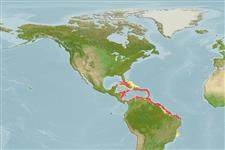>
Eupercaria/misc (Various families in series Eupercaria) >
Lutjanidae (Snappers) > Lutjaninae
Etymology: Lutjanus: Malay, ikan lutjan, name of a fish.
More on author: Poey.
Environment: milieu / climate zone / depth range / distribution range
Οικολογία
Θαλασσινό(ά) βενθικό(ς); εύρος βάθους 26 - 340 m (Ref. 9626), usually 70 - 120 m (Ref. 55). Tropical; 25°N - 19°S, 87°W - 35°W (Ref. 54572)
Western Atlantic: throughout most of the Caribbean Sea from Cuba southward to northeastern Brazil. Frequently confused with Lutjanus campechanus. Also referred to as Lutjanus aya by past authors, but Rivas (Ref. 6409) proved that Bodianus aya Bloch, 1790 is not a lutjanid, but probably a sciaenid.
Length at first maturity / Μέγεθος / Βάρος / Age
Maturity: Lm 43.0, range 42 - ? cm
Max length : 100.0 cm TL αρσενικό/απροσδιόριστο; (Ref. 55); common length : 65.0 cm TL αρσενικό/απροσδιόριστο; (Ref. 55); μεγ. δημοσιευμένο βάρος: 10.0 kg (Ref. 5217); μεγ. αναφερόμενη ηλικία: 18 έτη (Ref. 55)
Ραχιαίες άκανθες (συνολικά) : 10; Μαλακές ραχιαίες ακτίνες (συνολικά) : 14; Εδρικές άκανθες: 3; Μαλακές εδρικές ακτίνες: 8 - 9. Head short, its dorsal profile somewhat rounded behind eye. Snout short and blunt. Eye large. Preopercular notch and knob weak. Pectoral fins long, reaching level of anus. Scale rows on back rising obliquely above lateral line. Back and upper side deep red; lower sides and belly rosy, with a silvery sheen; the fins mainly red. A small spot is sometimes on the lateral line below the anterior portion of the dorsal fin rays. Young with a rounded black spot on upper side below anterior dorsal soft rays, disappearing with growth.
Adults inhabit rocky areas. They feed mainly on fishes, shrimps, crabs, cephalopods and planktonic items.
Allen, G.R., 1985. FAO Species Catalogue. Vol. 6. Snappers of the world. An annotated and illustrated catalogue of lutjanid species known to date. FAO Fish. Synop. 125(6):208 p. Rome: FAO. (Ref. 55)
IUCN Red List Status (Ref. 130435: Version 2024-2)
Threat to humans
Reports of ciguatera poisoning (Ref. 31172)
Human uses
αλιεία: Εμπορικό(ά)
Εργαλεία
Special reports
Download XML
Διαδικτυακές πηγές
Estimates based on models
Preferred temperature (Ref.
123201): 21.2 - 26.5, mean 24.8 °C (based on 38 cells).
Phylogenetic diversity index (Ref.
82804): PD
50 = 0.5000 [Uniqueness, from 0.5 = low to 2.0 = high].
Bayesian length-weight: a=0.01479 (0.01294 - 0.01691), b=2.97 (2.94 - 3.00), in cm total length, based on LWR estimates for this species (Ref.
93245).
Τροφικό Επίπεδο (Ref.
69278): 3.6 ±0.6 se; based on diet studies.
Ελαστικότητα (Ref.
120179): Χαμηλό, ελάχιστος χρόνος για διπλασιασμό πληθυσμού 4,5 - 14 έτη (K=0.09-0.12; tm=5.5; tmax=18; Fec=2,693,173 (mean)).
Prior r = 0.48, 95% CL = 0.32 - 0.72, Based on 3 data-limited stock assessments.
Fishing Vulnerability (Ref.
59153): High vulnerability (60 of 100).
Climate Vulnerability (Ref.
125649): High to very high vulnerability (75 of 100).
Nutrients (Ref.
124155): Calcium = 55 [29, 111] mg/100g; Iron = 0.512 [0.286, 1.003] mg/100g; Protein = 17.6 [16.0, 19.1] %; Omega3 = 0.209 [0.119, 0.358] g/100g; Selenium = 161 [77, 341] μg/100g; VitaminA = 25.5 [4.6, 118.8] μg/100g; Zinc = 0.399 [0.255, 0.618] mg/100g (wet weight); based on
nutrient studies.
